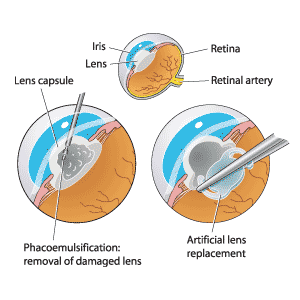Description of the procedure
A cataract is a cloudy film that grows over the eye's lens and impairs vision. In cataract surgery, the clouded eye lens is replaced with a clear plastic lens. This can restore vision in cases where vision has been impaired because of cataracts. This procedure is generally performed under local anesthetic as an outpatient procedure. A hospital stay is not necessary.
When should this procedure be performed?
The decision to have the surgery is based on a discussion between you and your physician. If both eyes are affected, one eye will be treated first, with a 4- to 8-week interval before the second eye is treated. The new lens implants are permanent and generally do not need to be replaced.
Why is this procedure performed?
This surgery is performed if a cataract prevents you from doing your daily activities.
Are there any risks and precautions?
Certain risks are common to all surgery and every time a local or regional anesthetic is used. These risks depend on many factors including the type of surgery and your own medical condition. The possible, but very rare, side effects include: side effects of the anesthetic, breathing problems, infection, and bleeding.
Although cataract surgery is generally considered safe, it does have some risk of side effects or complications. These include:
- bleeding
- decreased vision
- glaucoma
- increased eye pressure
- infection
- inflammation (swelling of the eye)
- retinal detachment (symptoms include sudden light flashes or floaters and specks that appear to float in your field of vision)
If you experience these side effects or complications, contact your doctor immediately.
Also contact your doctor immediately if you experience increased eye redness, nausea or vomiting, pain that persists after use of pain-relieving medication, or loss of vision.
If you are concerned about any symptoms following this procedure, speak to your doctor. Take the time to be sure you understand all the risks of complications and side effects as well as any precautions you or your doctor can take to avoid them. Be sure your doctor understands all your concerns.
What happens during the procedure?
Cataract surgery is usually done with a local anesthetic, so you will be awake during the procedure.
There are two ways your doctor may perform cataract surgery.
In phacoemulsification, the cataract itself is removed but the outer layer of the eye lens remains. In this type of cataract surgery:
- Your doctor makes a small cut (3 mm or 1/8 inch) where the cornea (clear layer at the front and centre of the eye) meets the sclera (white part of the eye).
- A tiny probe is inserted, which transmits ultrasound waves that break up the cataract.
- The broken pieces of the cataract are then suctioned out.
Extracapsular cataract extraction is performed when the cataract is more advanced. In this procedure, a slightly larger cut (10 mm or 3/8 inch) is made where the cornea and sclera meet, and doctor removes the cataract in one piece.
In both procedures, once the cataract is removed, your doctor will insert a clear plastic lens. The entire surgery takes about 30 to 60 minutes.
How should I prepare for this procedure?
Before having this procedure, discuss the advantages, disadvantages, long-term risks and consequences associated with the procedure with your doctor. Be sure you fully understand what will happen and are comfortable with your doctor's answers to your questions.
Prior to the surgery, your doctor will use an ultrasound to measure the size and shape of your eye lens in order to get the appropriate replacement and analyze if your retina is intact. Your doctor may also start you on antibiotic eye drops or ointment, and anti-inflammatory eye drops, a few days before the surgery.
Your doctor may recommend that you do not eat for up to 12 hours before the procedure. You may continue to drink clear liquids until 2 hours before the procedure. If your doctor has recommended different times, follow the timing recommended by your doctor.
Tell your doctor or prescriber about all prescription, over-the-counter (non-prescription), and herbal medications that you are taking. Also tell them about any medication allergies and medical conditions that you may have.
Ask your doctor or pharmacist whether you need to stop taking any of your medications before the procedure.
What can I expect after the procedure?
Following cataract surgery, you will likely feel some discomfort and itching. Do not rub or press your eye. You may be temporarily sensitive to light, so wear eye protection such as glasses, an eye patch, or a shield. You may also have some fluid discharge from your eye. This will ease within a couple of days.
Wear eye protection when sleeping to avoid rubbing or touching the eye accidentally. Your doctor may also recommend avoiding strenuous activity following surgery.
Your vision should start improving a day after the procedure.
Your doctor will prescribe eye drops to prevent infection, decrease inflammation, and control the amount of pressure in your eye. You will need to go to a follow-up visit the next day, as well as one week and one month after the surgery. At the final appointment, or once your eye has healed sufficiently, you will receive a prescription for new eyeglasses.
Results
Your vision will likely be clearer and more vivid. You may no longer need corrective eyewear. This improved vision allows many people to resume their regular activities.
All material copyright MediResource Inc. 1996 – 2024. Terms and conditions of use. The contents herein are for informational purposes only. Always seek the advice of your physician or other qualified health provider with any questions you may have regarding a medical condition. Source: www.medbroadcast.com/procedure/getprocedure/Cataract-Surgery

The cataract is removed from the eye lens with a phacoemulsification procedure (bottom left) and replaced with an artificial lens.






